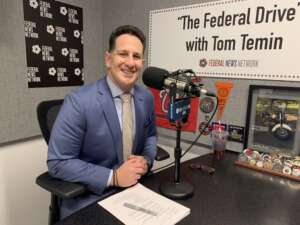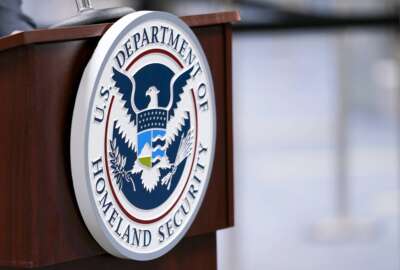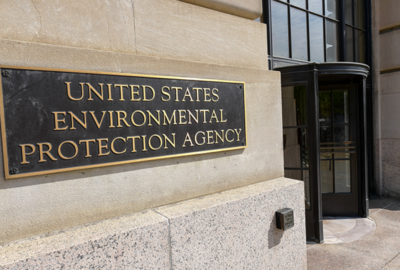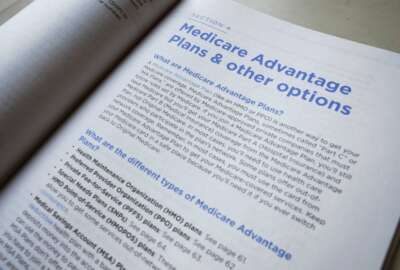These inspectors general are on the job year ’round
The Council of Inspectors General on Integrity and Efficiency, (CIGIE) figures that in fiscal 2023, its recommendations saved the government $100 billion.
Offices of inspectors general add up to 14,000 employees. If they were an agency, they would be a mid-sized one. IG people are scattered, but they do have the Council of Inspectors General on Integrity and Efficiency. CIGIE figures that in fiscal 2023, its recommendations saved the government $100 billion. For an update on all of that, the Federal Drive with Tom Temin talked, in studio, with CIGIE Chairman and Interior Department Inspector General, Mark Lee Greenblatt.

Interview Transcript:
Mark Lee Greenblatt Thank you so much for having me, Tom, we have a great story to tell. And I’m excited to share it with you.
Tom Temin And you’ve worked your way up to Chairman of CIGIE that came in as just a member and then you were vice chairman has fun at the top
Mark Lee Greenblatt It is and even before being a member I was the executive director, the lead staffer at the council. So yes, I’ve worked my way up, as you say, and it is a nice organization, nice community be a part of.
Tom Temin And is CIGIE demanding such that you can get some sort of dispensation from IG of interior, or do you have to be at full time to Hatter.
Mark Lee Greenblatt I am a full time to Hatter. And let’s just say it is a full slate of activities, a lot of good stuff going on both of the Department of the Interior in our Office of Inspector General but also in the OIG community writ large. As you said, we have 14,000 folks strewn across the entire world, frankly, and they’re doing incredible work. And that’s one nice thing as the chair of CIGIE is to be able to discuss the work of all these great professionals out there around the world.
Tom Temin And just give us the quick summary of 2023, the latest fiscal year for which you have full savings induced by Segi recommendations. Yeah,
Mark Lee Greenblatt It’s fantastic report that we just issued. This is their annual report to the President and to Congress, identifying in broad strokes with the OIG community has been doing. And this is a reflection not just of CIGIE, the agency, the federal, you know, organization in and of itself, but also the OIG community writ large. And as you mentioned, we have over $93 billion in potential savings. This is savings from the audit inspections and evaluation side, but also from investigative recoveries as well. And you know, when you compare that, with all of the federal IG budgets, which are about $3.5 billion dollars, you compare that with the, you know, over $93 billion in potential savings, you’re talking about a return on investment of $26 for every dollar invested into an OIG. So I think that’s a remarkable return on investment for the American taxpayer, for the stakeholders on the hill. And I hope they appreciate that we’re going to bat for them every single day.
Tom Temin And there is now some growing confluence between the Pandemic Recovery Accountability Committee, PRAC, because of the desire of CIGIE, and the CIGIE members to preserve the analytical platform that PRAC had created a little too late actually to prevent all of the fraud. But the sense is that this tool could prevent future fraud. What’s the progress on that?
Mark Lee Greenblatt This is a potential game changer, Tom, this is going to redefine how oversight works in the federal government, if we can get a data analytics center, like what we’ve done in the PRAC scenario, in the PRAC setting, in the pandemic relief legislation, if we can get that with respect to much broader scope throughout the federal government, it’s like putting in hyperdrive, I don’t know if you remember in Star Wars, when the Millennium Falcon hits hyperdrive, and it just shoots through the stars, that would be the equivalent of what we could do with our data analytics capability. All of a sudden, you’re talking about harvesting these data sets and doing these analyses that are far more complicated than I can understand. But they are hyper technical. And what we could do is ferret out real time information for agencies for OIG is to pursue leads. And there’s that preventative side, which goes to the agency. So we say we found these abnormalities, these are things you should be looking for agency before you spend this money, that is a huge piece that we can do. But also, once the money has gone out, we can give additional data sets to individual IGs and say, hey, look, this is abnormal, you should be pursuing this. This may be, you know, indications of fraud. And like I said, this would be a game changer for us. And it’s not that expensive. That’s the key we were talking about return on investment is technical, the return on investment would make that look like you know, nothing, frankly, it’s really, really important for us. And I think that’s the wave of the future.
Tom Temin But you need Congress to agree to this, because the PRAC will sunset. That platform is a real system. I think it’s a system of record at this point for the federal government. So it’s adaptable. But you have to make sure that they give you the means and the agreement that yes, we’ll pull this thing away from PRAC when PRAC goes away, and that will exist as something operated by CIGIE that’s the general model.
Mark Lee Greenblatt That’s exactly right. That’s the proposal that we’ve been working on with the hill with a number of stakeholders. There are some very interested parties we have great support for this concept. But you know it’s in the in the in the proverbial sausage making right and that’s where we are right now. There are some proposals out there we are working with them to fine tune those. We are generating support, but it’s tough. Anytime you’re are talking about mixing data. There are some folks that, you know, have concerns. And those are valid concerns. And we’re just addressing those trying to build support and get something through because you’re right, we need the authority. And we need the funding, frankly, because it’s not very expensive. But it’s beyond our capability.
Tom Temin We’re speaking with Mark Lee Greenblatt, Chairman of the Council of inspectors general on Integrity and Efficiency. CIGIE. And you had expressed in your latest annual report to Congress, the CIGIE report to Congress about plans for updates of oversight.gov, which is for a lot of people in and out of government, it’s kind of a go to site to see what’s going on with respect to waste, fraud and abuse. What are the plans for oversight.gov?
Mark Lee Greenblatt That is a great success story. I mean, just right out of the gate, that’s a great indication of what Siggy can do for the American taxpayers. This is a website that has all federal IG reports in one place, so they don’t have to go to 73 different offices and search their files to find a report. Now you can search by a number of different ways to find what you’re looking for. And its hyper sophisticated search terms. And so this can really drill down for members of Congress of the American public, we have now more than 29,000 reports on there. And it’s not just federal IGs, we have started including state and local IGs. Because if folks are looking for oversight, it doesn’t matter what level that’s occurring. They want all of it. And so we have 29,000 reports on there, we have updates on IG vacancies, that has been an issue over the years. And now we have a page specifically devoted to IG vacancies, we also are hosting websites. So now my own office, the Department of the Interior of IG, our website is now hosted on oversight.gov, which gives us some independence. So it doesn’t have to go through the department. Again, that facilitates the American taxpayer and stakeholders in Congress getting access and getting direct reports from us. They don’t have to go through the mechanism of the departments over which we are overseeing their projects. And that gives a significant amount of independence for us. Look, this is, as I said, a huge success for the American public and for the stakeholders on the hill. And we’re hoping to expand it. I think we’re going to hit 30,000 reports in the not too distant future. If so we’re going to have a massive celebration. And Tom, I think will ask you to be the emcee.
Tom Temin All right, you’re on Yeah, I’ll even give a little speech because I love following this stuff for so long. I love it. And then the pandemic spending is actually still going on. Unbelievably, inexplicably, that never dies. But then we’ve got the so called infrastructure bill and the inflation Reduction Act, these are still potential spending streams. At this point, a lot of money has been spent a lot to go is CIGIE as a group, our inspectors general looking at what did we learn from the fraud disaster, really, of PRAC that can maybe still prevent some of that from happening under inflation reduction and infrastructure? Absolutely,
Mark Lee Greenblatt We’re doing a deep dive on both of those Congress set up the PRAC, as part of the pandemic legislation, they did not do so under the other two, the Inflation Reduction Act and the infrastructure bill they didn’t set up. But we have set that up informally in our community, specifically for the reasons that you said, to learn lessons to collaborate to share notes, and focus on what are some of the key issues that you’re experiencing, we didn’t want to do this in a vacuum. And those have been very effective. It’s very different from the PRAC. With the pandemic scenario, that was a lot of money going out the door in a very fast fashion directly to users, directly to beneficiaries. Under the other two scenarios, the infrastructure bill and the inflation Reduction Act, both of those are long term contracts and grants, they have a much longer tail. And those are going to have a lot more government engagement with the money going out the door. And so the oversight efforts are going to be very different with respect to those latter two programs than the pandemic. And I think those fraud safeguards will therefore be heightened. We are also learning the lessons that you were just talking about to say, okay, what can we do better? And those are the things that we’re sharing with the agency, for example, the White House convened, what were then called the gold standard meetings. This is where they would bring the White House, OMB, the OIG and the agencies involved, as they’re designing and implementing a program and say, Okay, let’s talk about accountability measures, anti fraud measures that you’re going to put in at the outset. And they would have the OIGs ask questions. Again, this isn’t impacting our independence, because we’re not participating in the development of these programs. But we’re asking questions we’re giving best practices that we’ve seen elsewhere in the community. We’re using lessons learned that we’ve seen in our work before, to heighten their awareness of these things as they’re designing and implementing their programs. So we’ve taken that from the pandemic setting, which were called the gold standard meetings, and now we’re applying them with OMB in the White House to the infrastructure bill and the Inflation Reduction Act setting and those have been very, very successful from our perspective and having the buy in from the White House and OMB everyone in the same room all at the same time. It Just shortens the discussion. So it’s not a game of telephone.
Tom Temin And I should have thrown in the CHIPs, act two, which is maybe a little bit of a country cousin in terms of scale, to inflation reduction and infrastructure. But here again, you’ve got money going to what some say, would be subsidizing a profitable industry in the United States. And why they don’t make the same chips as China is kind of their problem. But are you again, the group CIGIE, looking in the effected members looking at ways to make sure we don’t have the next cylinder of chips, so to speak?
Mark Lee Greenblatt Yeah, that’s always a big topic for us is learning those lessons and applying those best practices going forward. This is one role that I’m very proud that the council plays in establishing and facilitating those very types of collaboration moments. That’s something that I’m very proud of. And yes, so I think those lessons are being learned and folks are communicating at a robust level, which is exactly what I think the American taxpayers would want.
Tom Temin And a final question, we’ve been talking somewhat about budgets for IG operations themselves outside of the prac. And all of that our IG offices adequately funded, do you feel?
Mark Lee Greenblatt Well, I think the answer to that question is always no, there’s always more that we can do. Right? There’s so much it’s fertile ground out there that we could do. The one thing that we’ve been focusing on with respect to the budget question at the council level, is looking at our smaller IGs. Many of them, their budgets are actually subsumed within their agency budget, and they don’t have a separate line, right. And what happens is, when you have these rainy days where you have these tough budget days, the agencies can read the OIG s budget. And so Congress is thinking they’re giving the OIG X amount, say, but the agency can dip into it, or the agency can give the OIG a tough time if they want to hire another auditor or another investigator. And that flies directly in the face of the Inspector General Act. And so that’s something that we’ve been working on with the White House with OMB and with our stakeholders on the Hill to say, hey, let’s try to separate those folks out. It’s a requirement in the IG Act, that it’s separated in the President’s budget. And we’ve had great success over the last year in separating them out. And that gives them that big measure of independence. So the agency can’t read their budgets. And that’s what all of us want is to have that independence inside all of our OIGs. And that’s a big step. I’m very, very proud of that, that we’ve been moving forward in preserving those smaller OIG budgets and keeping their independence robust.
Copyright © 2024 Federal News Network. All rights reserved. This website is not intended for users located within the European Economic Area.
Tom Temin is host of the Federal Drive and has been providing insight on federal technology and management issues for more than 30 years.
Follow @tteminWFED






